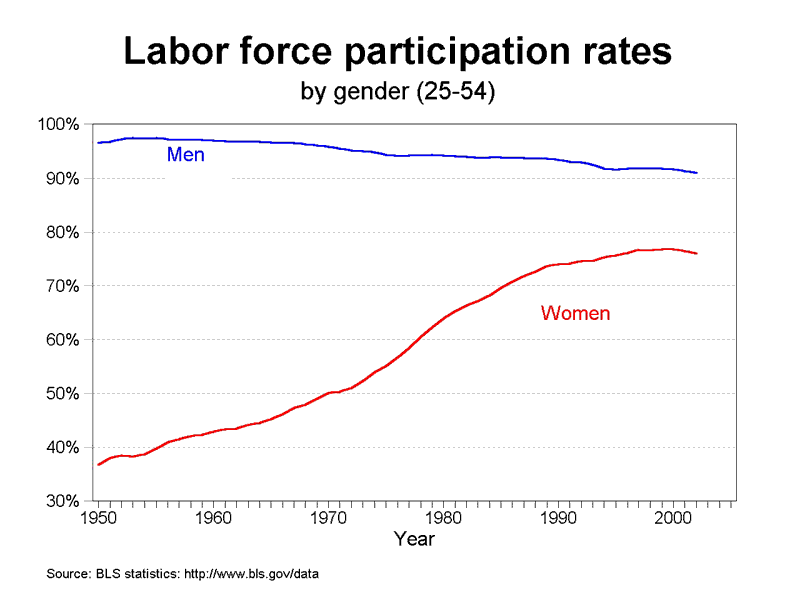-
Posts
20310 -
Joined
-
Last visited
-
Days Won
96
Content Type
Profiles
Forums
Gallery
Events
Blogs
Posts posted by obfuscator
-
-
-
-
Eh, counterpoint, every m/f couple I know wants kids. Even the ones I was pretty sure didn't want kids, like my brother, who just had his first kid at 36, after like a decade of being married.
I'm pretty sure America has had a below-replacement birthrate for most of its history. I don't think the rate at which people are having kids is really changing.
It's changed a lot lol...US births per woman in 1800 was 7.04 - now it's 1.8. https://eh.net/encyclopedia/fertility-and-mortality-in-the-united-states/
The majority of countries in the world have had significant drops in birthrate over the past 150 years - worldwide the drop has been enormous:
https://data.worldbank.org/indicator/SP.DYN.TFRT.IN
Even countries with high TFR have declined substantially: India for example went from 5.31 in 1960 to 2.33 in 2016. In fact, the only country on that list that has a higher TFR in 2016 than 1960 is DR Congo - went from 6.001 to 6.112
For this reason, most analysis I've seen predicts worldwide population peaking at around 10 billion somewhere around 2070 and then declining substantially. The main reason population has even kept growing up to this point is increased life expectancy
-
-
-
So of all of the literally millions of things that correlate with income inequality, you decided to pick labor force participation rate by gender? You don't think that's weird?
The posts I responded to didn't say anything about income inquality, they were saying salaries were higher when households had a single income. In response, I show that salaries declined in large part because most modern households have dual income, which is highly correlated with increased female participation in the labour force. No, I don't think it's weird, I think it's answering the question that was asked.
-
don't we see the same stagnation of real wages in fields that were all male and remain nearly all male?
Yes, but competition for those jobs still increases with the size of the labour pool because competition in other fields (where women work more) increases too - there are more men trying to get jobs in male dominated fields because it's harder for them to get jobs in fields that were previously male dominated and aren't anymore.
This is one of the "negative" effects of increase female labour force participation, but there have been a ton of positives too - consumer goods are generally much less expensive today than they were fifty years ago. The increased pace of technology and innovation is also due to more women working to a significant extent. My point is just that when it comes to economics, most phenomenon are not *all good* or *all bad* - in most cases, there are pros and cons..these things are all about tradeoffs. What you consider an appropriate tradeoff depends on your personal biases, like most things.
-
Weird thing to blame it on but ok
Why is it weird? It's completely consistent with economic theory that when you increase the supply of something relative to demand it has a depressive effect on prices (salaries when it comes to employement).
Here's some info on female labor force participation rate if you doubt that it's increased significantly since the 50s.

-
@both of you: I agree, but the single biggest reason for this is likely increased female participation in the labor force. Increased supply of workers = more competition for jobs, salary declining. Unless we want to return to 1950s, where most women didn't work, this is the reality we have now.
-
Jones does make those "non-average" people a lot worse than they would be without his existence. My dad has always been conservative, but it's only been since he started listening to Jones and alt right people online that it's felt dangerous. I don't feel that, had he only ever had access to mainstream media, his political opinions would have ever been this far right.
So I guess you have to weigh whether "won't be taken seriously by most people" is enough of a benefit to outweigh "will radicalize some people and make them out and out neo nazis". My cost/benefit feels like, no, that's not a good tradeoff, but
How many people are actually neo-nazis because of alex jones (and other online personalities), though? I think it's probably a miniscule amount. Furthermore, how many neo-nazis actually engage in violent or illegal activity?
Again - if you accept that the government has the right to decide what opinions are acceptable and which aren't, that immediately affects *everybody* - and suppression of free speech rarely tends to work out in its proponents favour.
My view is basically that isolated violence perpetrated by a few select idiots is much preferable to mass violence perpetrated by the state, which is what you get when you take away free speech rights.
-
Agreed (about responsibility, anyway), but you do you do that practically? unless someone nakedly condones violence, you immediately fall into the trap of government essentially having to decide what opinions are acceptable and which aren't, which causes massive problems much worse than anything alex jones does
and tbh dealing in misinformation and highly biased viewpoints is just as prevalent in a lot of "mainstream", "respectable" media as it is someone like AJ. I almost think he's better because at least the average person is probably pretty aware he's full of shit
-
I think that's a pretty big get out of jail free card...
missed this...what's the alternative, though? There will always be people (lots of them) who do stupid stuff and look to someone influential to provide something that can vaguely justify it. It's not prudent to hold people responsible for the actions of others unless the actions are extremely serious, and it's practically certain that the person of influence is knowingly acting maliciously.
-
This is probably the most intelligent approach to anything that is as complicated as national employment trends - Admitting that you don't have the answers. What I find most frustrating is that someone somewhere has hard factual data on these things, but it's always impossible to find through all the garbage and bias of other people's thoughts and opinions.
Actually, a lot of these questions are just hard to answer. Statistics can give you the basic facts, but extrapolating complex trends from that is hard enough that there's an entire profession devoted to doing so. There are a lot of really good economics papers that cover these questions, but there isn't always a consensus, and they aren't necessarily written with the average person in mind.
I wonder if nepotism also adds to the "bleak" factor in modern job hunting.
if I had to guess I'd say nepotism is probably *less* prevalent now than ever, if for no other reason than that companies have much larger pools to recruit from and many more means of doing so than they did 30 years ago.
-
 1
1
-
-
but from my completely anecdotal personal experience of gathering takes from people in the engineering industry, I get the impression that the job market for young people is bleaker than it has been in some time. and I seemingly hear this over and over from people. yet unemployment is very low.
the problem with anecdotal evidence such as this is that there's no way it can capture a society wide phenomenon. I've heard (and experienced) pretty much the opposite, at least in technical fields.
I know that statistic doesn't include people who have stopped looking - were a lot of people just knocked out after the recession and have stopped trying to get up? are more of the current jobs considered shitty than they used to be? are people living and working longer, preventing people lower down from moving up and creating a logjam at the bottom?
it is true that labor force participation rate has declined over the past 20 years (though it is still much higher than it was in the 50s and 60s), though it does tend to have a moderate inverse relationship to unemployment rate (there's been a recent uptick as unemployment has gone down).
There are definitely demographic issues that most western countries have relating to aging populations and increased female participation in the workforce. The implications of all this definitely go beyond the scope of my knowledge though
I don't really follow mainstream media but it seems that people on the right and left were saying in 2016 that the us job market was in the worst state it had been in decades. that doesn't seem like something that could really reverse in 2 years. of course at election time both sides have an incentive to sell the idea that everything is going to hell unless they get out in charge, but I still see this take from normal people who have no reason to try to convince me either way
if I can't even confidently assess the present state I don't see how I can make recommendations for the future
/ramblepost
Unemployment in 2016 was at 4.7%, so it's definitely decreased since then...the economy has generally done well over the past 2 years. There was a minor recession in 2015-2016, so some of it is a rebound from that. Still, 4.7% unemployment isn't at all bad.
I think a lot of the angst about the job market in 2016 was due to the political angle like you suggest, but also because emotional and anecdotal evidence tends to resonate with people more than statistics do. If a minor recession occurs and 100k people lose their jobs, the natural emotional reaction to that is to freak out, but as previously mentioned it's not nearly as big of a problem as some might think.
Anyway - the big takeaway from all this is not that everything is 100% great and definitely going to remain so - more that people like to panic and it isn't always warranted. Though there are some negative indications, there are a lot of positive ones too.
-
-
I should have added Estonia to my unemployment rate list: 5.3%
Our Baltic compadre does bring up a good point as well - unemployment figures don't take into account jobs where demand exceeds supply..for example the US has ~50000 truck driver jobs that are currently unfilled. Obviously they're unfilled for a reason, but there's some reason to suggest that rate could go down before it goes up.
-
 1
1
-
-
Agreed, but 350 million is a huge number too. It's tempting to look at these issues from our individual perspective (and completely understandable), but it often differs immensely from the societal perspective.
This whole scandal the Canadian government is going through right now, for instance, happened over 9000 jobs - a minuscule amount for a country as large as Canada.
-
So what would you say the threshold is for dangerous levels of unemployment in America? With a 2017 population set at 325.7M and a 2018 unemployment average of 4% that would leave something like 1.3 million people unemployed. Not to mention this figure completely ignores under-employed people. Even if the modern projection of 3.5% trend continues, what would you guess an absolute number to be where unemployment becomes significant?
Absolute numbers of unemployed people are pretty much irrelevant, because society can support a certain percentage of unemployed people. Rates matter.
For example, there are people who either can't or won't work who are supported by their families, for whatever reason. There isn't an absolute number of these people that's a problem - it's the number of them relative to their supporters (family members) that's important.
There's definitely a threshold for dangerous levels of unemployment in America, but that threshold is measured by an unemployment rate, not in absolute numbers. I don't know what it is (I'm not an economist), but you're not anywhere close.
For context, unemployment rates for some other countries:
Canada: 5.8%
UK: 4%
France: 9.3%
Germany: 3.4%
Sweden: 6.6%
Mexico: 3.6%
Russia: 4.9%
Spain: 15.2%
Of those, only Spain would be considered to *clearly* have an unemployment problem, and France is getting there.
-
Which sounds good, but as population increases I fear that available job markets are stagnating.
This may end up being the case, but it's no better than a guess at this point
Even if unemployment rates stay around the same number, that only means the hard figure of actual unemployed people is growing
The absolute number of unemployed people isn't that important - what's important is as a percentage of the overall population, which is what employment rate tracks.
ex: 10000 people being unemployed is a huge problem in Liechtenstein, and a complete non-issue in the US
-
-
-
-
in true dictatorial fashion, I will vote for myself
I nominate Bonez899:

-



Today...
in Off-Topic
Posted
not any mods to show up lol